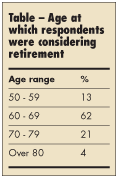Primary Care Clinicians: Will You Slow Down, Retire (Partial or Full), or “Nevertire”?
 Primary care clinicians view retirement in many ways. I wrote a guide to physician retirement that was published by the American Academy of Family Physicians (AAFP) in 2004.1 The book included a randomized survey of 2000 AAFP members over the age of 50, and it also included a review of the retirement literature and stories from several physicians and their spouses.
Primary care clinicians view retirement in many ways. I wrote a guide to physician retirement that was published by the American Academy of Family Physicians (AAFP) in 2004.1 The book included a randomized survey of 2000 AAFP members over the age of 50, and it also included a review of the retirement literature and stories from several physicians and their spouses.
More than 800 physicians responded to the survey (90% male, 10% female). Forty percent (320) of the respondents were retired; of those, 66% (211) were fully retired.
If they were not retired, respondents were asked at what age they were considering retirement (Table). Only 40% of this group chose full retirement. The group who were not retired at the time of this survey would retire earlier, and most would choose partial rather than full retirement.
When respondents were asked what their concerns were about retirement, the top concerns were as follows:
•Won’t have enough money (55%).
•Will become bored (30%).
•My health (30%).
•Keeping up with medicine (29%).
•No longer making a contribution to society (24%).
Several interviews in the book stressed that feeling useful or needed was critical to self-esteem in retirement. Being a physician provides daily reinforcement for self-worth. Several retired physicians suggested that pre-retirement planning for a hobby or a volunteer activity that will boost self-esteem was critical to happiness in retirement.
When respondents were asked for their major reasons for retiring or considering retirement, their top concerns were as follows:
•Want to pursue other interests (38%).
•Government impact on medicine (38%).
•Time to travel (35%).
•Managed care frustrations (35%).
•Spend more time with my family (28%).
•Burned out (23%).
Reasons for retirement are split between getting away from the frustrations of medicine, pursuing other interests, and time with family and travel.
This survey was conducted 10 years ago, and updated information is needed for the following reasons:
•There are now more female primary care clinicians.
•More clinicians are considering partial retirement or a new way of retiring called “nevertirement.”2
The word “nevertirees” was created by Barclays Wealth to describe clients who never see themselves as retiring. A recent global survey of high net worth individuals by the Ledbury Research Report indicates that 75% of the respondents in the United States are not planning a traditional retirement.3
Feelings about the age of retirement are changing for a variety of reasons, such as:
•Many persons remain productive after age 65.
•Age is considered a relative term.
•The mandatory retirement age is increasing.
•There is more uncertainty about the economy, social security, and retirement accounts.
•People are healthier, and modern health care is prolonging life.
If you are age 50 or older, how do you feel toward retirement, slowing down, and/or being a “nevertiree”? I invite you to complete a survey to answer these questions and more. The survey is available at https://www.surveymonkey.com/s/retirementslowingdown, and it takes about 7 to 8 minutes to complete. The results will be published in a coming issue and on the www.Consultant360.com web site.
1. Shahady EJ. A Physician’s Guide to the Art of Successful Retirement. Leawood, KS: American Academy of Family Physicians; 2004.
2. Barclays Wealth Insight Report. September 2010.
3. Lebury Research Report. Available at: https://ledburyresearch.com/news. Accessed March 17, 2012.


